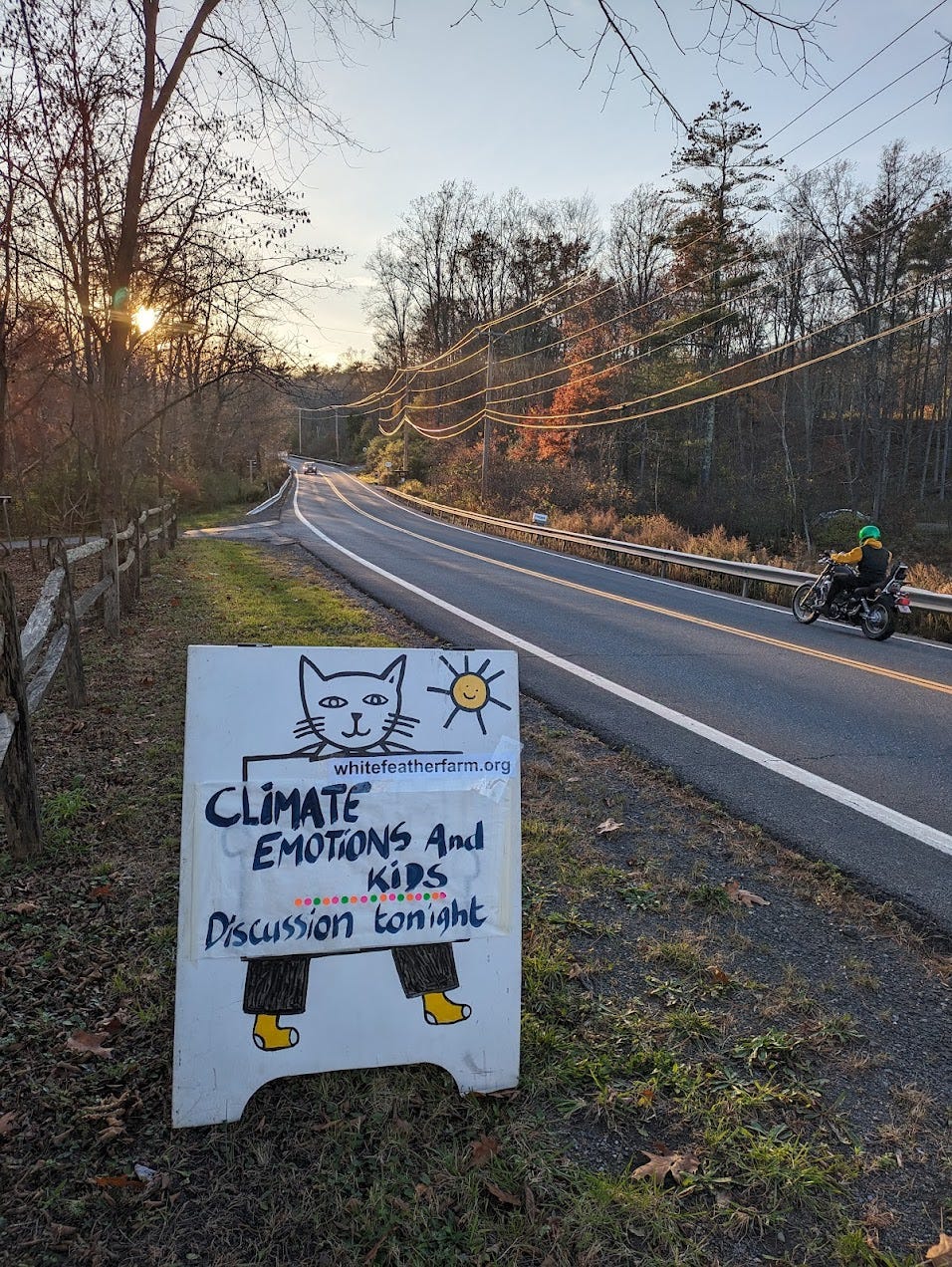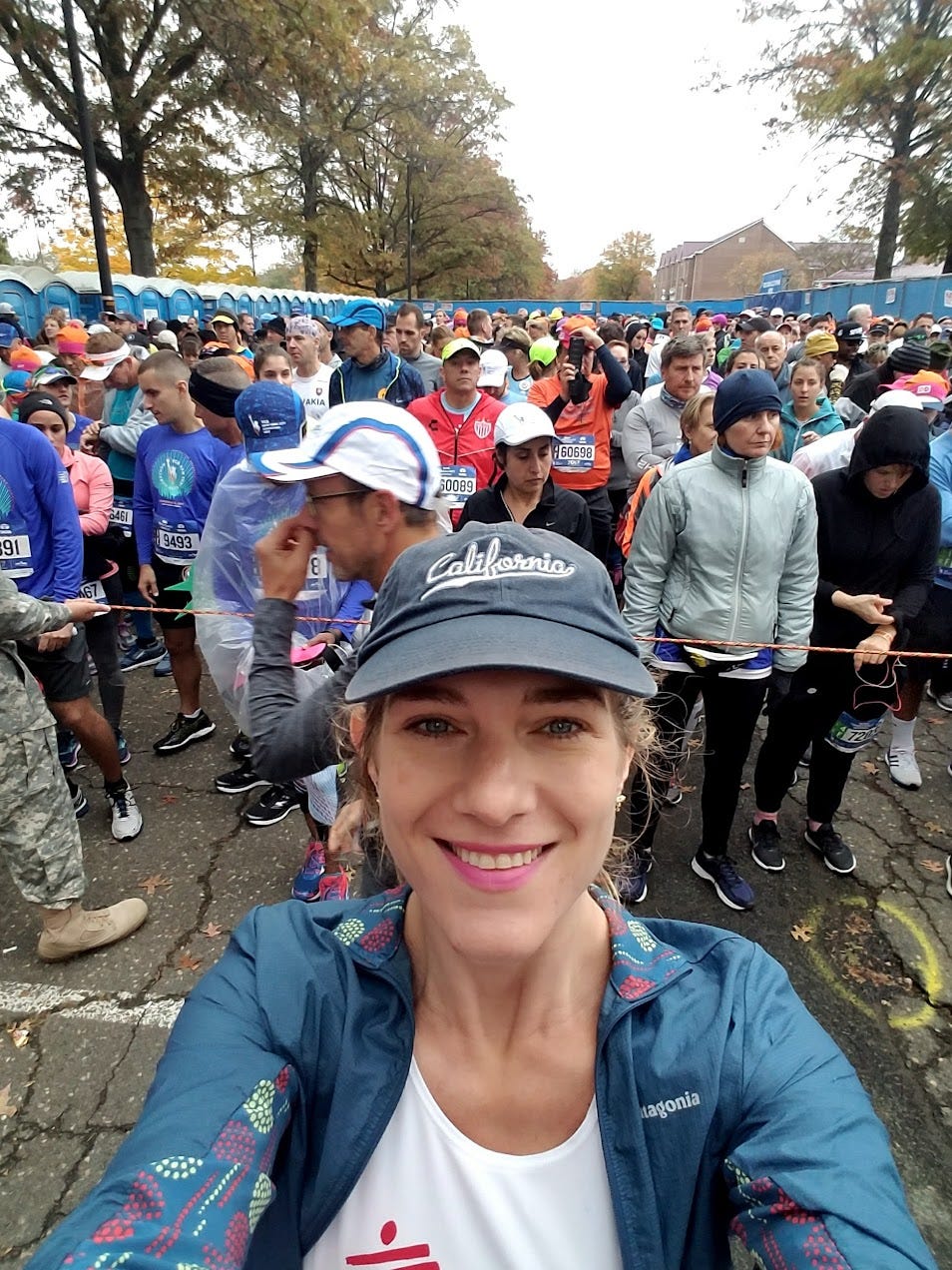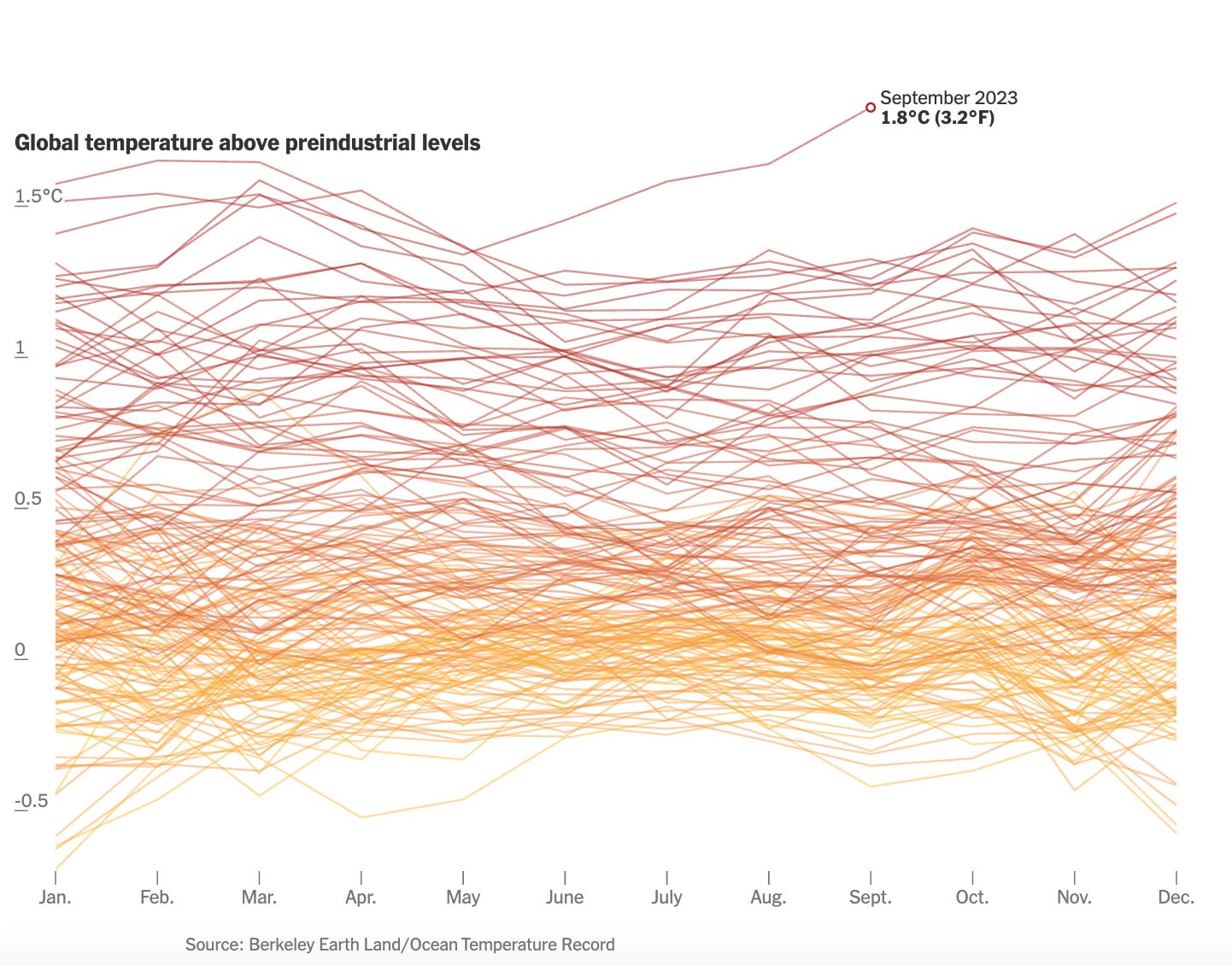Moments of Shared Truth; Talking To Kids About Climate
Shared joy is double joy; Shared sorrow is half a sorrow--Swedish proverb
I have a confession. I haven’t been totally honest with you.

Week after week, I use this space to dive into the really tough stuff: the climate crisis, war, the unconscionable killing of children. I am as honest as I can be about all of it.
But the truth is, I don’t keep my head in these dark places all the time! I don’t know if anyone could or should. My life from moment to moment is full of gratitude, joy, pleasure and silliness. I’m going to make a better effort to include those moments here as well.
This past Sunday morning, for instance. The kind of warm, clear fall day that the Russians call “бабье лето”—grandma summer. I walked a few blocks with my almost-7-year old to watch the New York City Marathon. She ran into her best friends, and these four super cute, hyped up little kids snagged a spot on the curb, where they could high-five the runners and jump up and down and cheer their heads off. With our front row view, we saw the blind runners with their guides, the wheelchair racers, people wearing flags of a dozen nations, Indigenous people in gorgeous traditional headdresses, and a man bounding around the corner on two curved prosthetics, otherworldly-looking, gleaming in the sun.
I was taken back to exactly seven years ago, when I was watching those runners with that girl in my belly, five days overdue. Queasy, tipping over, tight as a drum, I promised myself, “I’ll run with them next year.” And six years ago, I did.
Frida Berry Eklund on Talking to Children About Climate : “Have the courage to be honest”
Friday Berry Eklund is founder and senior adviser, Our Kids’ Climate and author of the book "Prata med barn om klimatet" (Talk to Children about Climate). Since the book is only available in Swedish, I connected with her over Zoom to get her best tips.
“The biggest question I get is: How do I talk about this without scaring my kid and also, how do I manage my own feelings? In this context I feel despair, and I feel hopelessness. But I still want to instill a sense of hope, and meaningfulness and a positive vision for my child’s future. So I think a lot of people are kind of experienced in that double-doubleness, if you like.”
Here are her top tips—condensed and edited from our conversation.
1. Read up yourself about the topic
I mean, it's obviously big and vast and scary and huge. But I think it is important that we understand the severity of the situation ourselves and kind of deal with our own emotions and feelings around that before we broach that topic with children.
Climate 101- Climate Reality Project
2. Ask an open-ended question about climate
Have you thought about climate change? Do you know about climate change? What are you thinking about when you hear climate change? What does Greta actually fight for? Do you know what she's all about? A lot of times they know a lot more about it than adults do.
Illustrated guide for kids and a printable comic
Greta Thunberg profile for kids
3. Ask ‘How are you feeling about that’?
What's been really clear in this work for me is that you can't just educate or talk about this topic without also connecting it to how we're feeling about it, because the emotional responses that we have are such a key part of what we do next.
Climate emotions guidelines for parents
4. Pinpoint what really sparks their interest
Particularly with younger children, a lot of them are really interested in how animals are responding, or plastic in the oceans, or recycling. That is great-- to learn more and to learn more together with your child.
Defenders of Wildlife; World Ocean Day
5. Have the courage to be honest about where we are
It is a really serious situation. Don’t give false assurances. We know we caused it. We're seeing the effects right now particularly in vulnerable communities around the world. We know that there's there's a lot of stuff that is coming down the pipeline that we need to prepare ourselves for.
But we do know what the solutions are. And we can all contribute. Being honest that it is difficult, and that we don't have all the answers, I think, is a really key part of this conversation. Because young people know if we're kind of skirting the issue, or if we're playing it down. And that's a fine line. Because, yeah, you know, it's not about scaring children, or, you know, alarming children. But it's really about being honest. We don't know what's going to happen.
At this point in our interview, Frida and I broke the fourth wall a little bit, as she confessed that she was in a moment of climate despair.
“You're catching me at a bad time. I’m not in a super positive mindset. It's not looking good. The projections, the scenarios, the concrete action, is not lining up with targets, and is not lining up with where we should be heading because of the lag in the systems. Even if we stop emitting everything tomorrow, there's still a lag time of 20 years of worse coming. [NASA says less than a decade; Earth.org says between 10-20 years].
“So I think that is difficult. When you see that kind of line every year, not bending.”
“And I think in my community of climate-aware, particularly women, there's lot more conversations these days about, with one hand really trying to do what you can in terms of. you know, campaigning and advocating and all that stuff, and with the other, on a more personal level, preparing, building resilience, thinking about where it's a good place to live in the future.”
I’m sharing this not to freak you out, but because I valued this exchange so much.
The reason I switched to covering climate, and to being an independent journalist, was for the opportunity to be real with people.
Several times a week, I’m in conversation with people who aren’t afraid to say that they’re really, really worried about climate change. Whether in interviews, meeting with colleagues; or conversations that I hold space for, as with the focus groups I’m doing with families about talking to children about climate emotions (sign up here), or with community groups like at White Feather Farm in upstate New York last week.
And it feels really good! It’s such a relief to be together in the truth with people. About the good and the bad. Thank you for being here, and listening.
Links
Great column with lots of recommendations : “What I Read to My Son When the World Is on Fire”
Voice notes from a mother and journalist in Gaza
Co-directors of Standing Together, an organization dedicated to Arab-Jewish partnership for peace, speaking at a synagogue in NYC : “We fight inequality, injustice and extremism, because we understand that justice is the precondition for a successful democracy and the only lasting road to peace.






